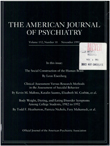Loss of drug effects during continuation therapy
Abstract
OBJECTIVE: This study sought to determine what proportion of relapses during continuation therapy with antidepressants can be attributed to loss of nonspecific placebo effects while the patients are taking the drugs. METHOD: Depressed patients were studied over a 12-week period. One hundred sixty-four patients were randomly assigned to placebo, 174 to imipramine, and 169 to phenelzine. At 6 weeks 35 were judged to be responders to placebo, 70 to imipramine, and 96 to phenelzine. These patients continued their double-blind treatment for weeks 7-12. RESULTS: Thirty-one percent of the patients who were taking placebo, approximately 12% who were taking imipramine, and approximately 9% who were taking phenelzine relapsed in the 7- to 12-week phase. Two different methods of estimating relapses suggested that during the first 3 months of treatment, a large percentage of the relapses of patients taking drugs was attributable to the loss of nonspecific placebo effects rather than true drug effects. CONCLUSIONS: A considerable proportion of relapses in the first 3 months of treatment with antidepressants appears to be due to loss of placebo effects. These clinically relevant data may be used to encourage patients who relapse during this period, and who erroneously conclude that anti- depressant effects are temporary, to try another medication.
Access content
To read the fulltext, please use one of the options below to sign in or purchase access.- Personal login
- Institutional Login
- Sign in via OpenAthens
- Register for access
-
Please login/register if you wish to pair your device and check access availability.
Not a subscriber?
PsychiatryOnline subscription options offer access to the DSM-5 library, books, journals, CME, and patient resources. This all-in-one virtual library provides psychiatrists and mental health professionals with key resources for diagnosis, treatment, research, and professional development.
Need more help? PsychiatryOnline Customer Service may be reached by emailing [email protected] or by calling 800-368-5777 (in the U.S.) or 703-907-7322 (outside the U.S.).



